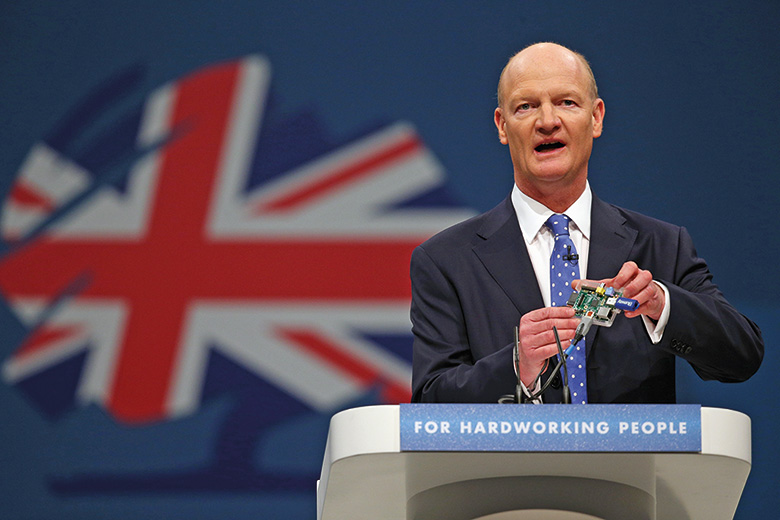The incident that, for me, best captures why I love universities had an unpropitious start. A visit I made to the University of Southampton, as minister for universities and science under the coalition government, was greeted with shouted denunciations of our lifting of the tuition fee cap to £9,000. I went over and tried to talk to the protesters, but they could not hear my replies. So they lent me their loudhailer to hear my argument better. Then I gave it back so that they could broadcast their reply. They returned it to me again, and so we carried on the exchanges. Their anger could not suppress their curiosity. It was really rather moving.
Not many people say that they love universities at the moment. In 2015, when I stood down from the House of Commons, it looked as if universities were heading into calmer waters. The financial settlement meant that, at last, England had a sustainable and progressive way of funding universities. Because we had got rid of number controls, universities could continue to expand, and so deliver increasing access for shockingly under-represented groups. Of course, there were still challenges, such as the decline in numbers of part-time students – but I believed the path was set.
But, since then, new uncertainties have been created by Brexit, the reopening of the funding debate and the replacement of the Higher Education Funding Council for England with the Office for Students. Universities are now caught in hot controversy. That makes it even more important that we understand them in the context of the wider higher education system that shapes their behaviour. Over the past decade, many people in universities and beyond have generously given a lot of their time trying to educate me on this, and my new book, A University Education, tries to convey what I have learned.
A medieval concept, the independent corporation has proved to be extraordinarily well suited to one of the most important purposes of a modern society: the creation and transmission of knowledge. England’s research-intensive universities are the institutional equivalents of the giant California redwood trees in the natural world – deep-rooted, long-lived and with the power to shape an entire ecosystem around them.
We think that we know what makes a good university – competitive admission for students with high levels of prior attainment combined with a focus on research. That is the type of university that commands prestige, but it can lead us to assume that other models are “bad” when they may just be different. These attitudes are particularly pervasive in England because of the dominance of the universities of Oxford and Cambridge, achieved by systematically extinguishing other attempts at creating universities for 600 years.
But now universities come in many shapes and sizes and, together, they make up a system of higher education that achieves far more as a whole than any one type of institution within it can do on its own. It is not possible to rank universities with different missions along one single dimension – a message that might be relevant to Times Higher Education’s approach to rankings. But universities themselves can be so preoccupied with the differences between them that they fail to acknowledge their interdependence and to make the case for higher education as a whole.
This wide range of universities is partly a result of higher education’s shift from an elite to a mass institution. The doubters argue that Kingsley Amis was right and “more means worse”. But this expansion – mirrored across the West and, increasingly, in developing countries, too – is actually one of the great achievements of post-war societies and is crucial to the advance not just of economic opportunity but of liberal values as well. We should be proud of it and go further still, with more students and an even wider range of universities. This argument needs to be heard now more than ever, given the return of scepticism about universities and the value of higher education.

But the English education system is by no means perfect. In particular, the relationship between the university and the school system is problematic. In most other Western countries, citizens are entitled to study at a local university provided they pass some minimum standard in a school-leaving exam. But in England nobody has an automatic right of admission anywhere: entry is solely by nationwide application and competition. Each university controls its own admissions and alone decides whom to admit. Since we reformed the system, there have not even been any controls on numbers. The incentives universities face are to focus on research performance and to select students with high prior attainment in the subject that they are applying for because these determine positions in the league tables that enhance (or detract from) institutions’ existing prestige. That prestige, in turn, attracts good students, and makes recruiters in the leading professions anxious to employ those students when they graduate.
The competition among young people to get into the “good” universities in turn promotes competition to get into those secondary schools that maximise their chances of success. These schools focus on their performance in A levels, so the main function of what is increasingly, in practice, England’s school-leaving exam is to assess 18-year-olds for university entry (indeed A levels were originally created by universities for that very purpose, in an era when most people left school at 16). This, again, is different from the school-leaving exams in many other countries, which give more weight to a broader education. English 16-year-olds take life-shaping decisions that many Western countries do not expect until the age of 20. As a result, they cut themselves off from some of the great achievements of our culture – either in science or the arts. This is barbarism, and tackling it – in which universities must play a leading role – should be England’s next big education reform.
The influence of university entrance competition extends even further down the education system. The notorious selection for education by house prices does not just occur around secondary schools – the effect is as great in the neighbourhoods of those primary schools that feed the secondary schools that feed the universities. And the competition has intensified because of the expansion of higher education and its crucial role nowadays as the gateway to professions and to the middle class. Up to the 1960s, access to university was mainly for a social elite, together with some bright, hard-working grammar school boys (and a few girls); for everyone else there were many other routes to a decent job and, indeed, into the professions.
The English higher education system has emerged through a series of key decisions on student support, the creation of new universities and the establishment of a central admissions system. Most of this had been set in train in the late 1950s and early 1960s, before Lord Robbins delivered his landmark 1963 report on university expansion. Ever since that growth started, we have been arguing about how to fund it; within a year of publishing his report, Robbins was looking forward to the day when a student loans system would finance higher education.
But, whatever your view on funding, it is clear that university expansion changes lives for the better. There are economic benefits (higher productivity) and non-economic ones (greater tolerance). There are personal benefits (higher earnings) and public ones (less crime). Those three years at university can be as transformational as a child’s first three years – but the early years advocates have done much better at linking economic and non-economic arguments and adding a dose of neuroscience to explain their case.
There also remains a big question about who should be given access to those later three transformational years. If a school-leaver has suffered from poor-quality schooling, does that mean that they are less likely to benefit from higher education – or, conversely, will they surge ahead if they get to university? The good news is that university is the only stage of education at which the performance of young people from less affluent areas may advance relative to those with the greatest advantages.
There is also an issue over how to ensure that universities are incentivised to do the best possible job of educating their students. This is particularly the case in a country such as England, in which universities have such high reputations and deep roots. There is, rightly, wide acknowledgement that their particular purposes differ from those of commerce or politics, and that makes them powerful protectors of freedom of speech and academic enquiry. But this very prestige – such a source of pride both to the universities themselves and to the nation as a whole – can look to an economist like producer power, with insufficient attention paid to students and little competition from alternative ways of doing things. The challenge that I faced as minister was how to protect universities’ autonomy and strengthen their finances while opening them up to more challenge and putting them under more pressure to improve their teaching.
On the latter point, it is, of course, hard to measure teaching excellence: the teaching excellence framework (recently renamed the teaching excellence and student outcomes framework) devised under my ministerial successor, Jo Johnson, is a bold attempt, but there is a lot more to be done to crack it. Research, by contrast, is measured and analysed with extraordinary sophistication, and, in the UK, we can be proud of how we measure up. But, however admirable, research excellence is not the same thing as being good at applying research and taking it out into the marketplace. It may indeed be a different type of university that excels at that; one reason I am very wary of the recommendation in the 2016 Stern review that all researchers be submitted to the research excellence framework is that it could promote a research monoculture when there are actually different ways of being excellent and different university missions.

On the subject of knowledge transfer, I often encounter the assumption that study in a British university is removed from any practical training that requires an apprenticeship. This goes back to highly value-laden distinctions between “liberal” and “mechanical” arts. For most young people in the UK’s flexible labour market, going to university is likely to be a better bet than an apprenticeship. But almost 60 per cent of students are working to get a vocational or business qualification, and many occupations become professions by requiring a university degree. Universities have not always done a good job at designing professional education, but I am particularly unimpressed by the attack on university-based teacher training in the past few years.
Universities are increasingly important economic players, both in their own areas and nationally. This is partly because of their size – a large British university could well be the biggest employer and the biggest exporter in its area. Some academics are sceptical about these economic roles and attribute the troubles of modern universities to markets, managers and ministers. They argue that if only universities were protected from that unholy trinity, they could be true to their historic roles. In particular, they dislike the forces of “marketisation” and “consumerism”. But I would much rather live in a society with big, strong, outward-looking universities than one in which they are smaller and less engaged with national life.
“Consumerism”, meaning students choosing where they go to university, is a particularly pronounced feature of the English system because of the lack of any entitlement to go to a local university. The removal of number controls means that more students are now getting to attend their first-choice institution. And it means intense competition between universities to attract students – contrary to claims that the clustering of tuition fees at the maximum permitted level (just raised to £9,250) means that there is a cartel in operation. That competition, within the legal framework of a contract to deliver services, is good for students and strengthens universities.
I accept, of course, that there is more to education than delivering a service. The idea of a university as a community of scholars and students is a powerful one. For many institutions, the way they live up to that idea is by a trusteeship model, whereby their primary responsibility is to “pass this university in this place on to future generations in at least as good a shape as we found it”. It is a noble purpose. But there is also an enterprise model, whose rationale says: “The world is hungry for higher education and we should use the tools of modern commerce and private capital to spread it to more students than ever before in networks of universities.” Global higher education chains already exist, educating hundreds of thousands of students, and I regret that the UK has not yet produced any of them.
Such conglomerates represent just one of the threats facing universities. The two great contemporary forces of globalisation and digitisation, which have disrupted many key industries, have yet to disrupt higher education significantly, but it is starting to happen. One example is “disintermediation”: completing an online course and then adding it to your LinkedIn profile: this may challenge the significance of traditional university degrees in the job market.
A further threat is cultural. The current controversies – notably, Brexit – have revealed an enormous gap between British higher education and wider society. Universities need to do better at understanding what people are worried about and engaging with it – either to agree, or to assemble the evidence that shows why the worries are misplaced. That means empirical evidence and clear arguments. Those are the very values at the heart of the idea of the university, so it should be possible to rise to the challenge. Understanding how universities can sustain those values today has been my own university education. l
Lord Willetts was UK minister for universities and science between 2010 and 2014. His latest book, A University Education, is published by Oxford University Press on 23 November.
POSTSCRIPT:
Print headline: For the greater good
Register to continue
Why register?
- Registration is free and only takes a moment
- Once registered, you can read 3 articles a month
- Sign up for our newsletter
Subscribe
Or subscribe for unlimited access to:
- Unlimited access to news, views, insights & reviews
- Digital editions
- Digital access to THE’s university and college rankings analysis
Already registered or a current subscriber?








